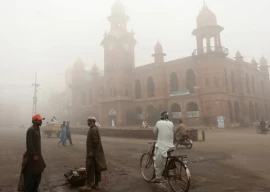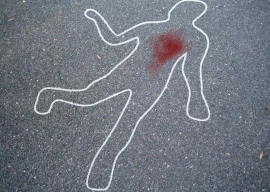
I recall being intrigued several months ago when I encountered the Café Bol Facebook page, showcasing a weekly ‘Thus Spake Nietzsche’ night. The site of the café, a tiny room in Main Market adjacent to a narrow street surrounded by tea shops, mechanics and tailors, initially left me wondering why anyone would open a café in a place where few people would bother making the trip. Then I realised that the entire point of Café Bol is to weed out the “genuinely motivated” from the sloganeers.
The place itself consists of a small, rectangular room with no furniture, plenty of rugs and cushions, a ‘Bol’ poster, a bookshelf and a “kaava station” (read rickety table, with a portable gas stove). The menu consists of teas from all over Pakistan and beyond. “We have orange kaava, Irani kaava and Balochi, Sindhi, Peshawari blends,” Qalandar says, as he opens up an assortment of plastic bags and jars.
“Café Bol is really all about cutting across class structures, we are trying to provide a forum for ideas to be exchanged. Ideas that really don’t find a space anywhere else,” he says.
The parallel with Pak Tea House in the 70’s is obvious, but Qalandar insists that Bol “isn’t about demagoguery. There’s all kinds of talk, and the crowd tends to drive discussions towards politics and religion because that’s the way we are conditioned, but I lean towards philosophy and the arts, or obscure themes that aren’t really touched upon in college classrooms or anywhere else.”
Both the location and premises enhance the air of intrigue around Café Bol. This tiny room has an open window overlooking workers busy welding something or other, while the wall opposite is covered by a red poster of Che Guevara and shelves lined with Good Books. It is a peculiar, uncomfortable and yet poignant buffer zone. “I never wanted to cover up the walls. I like the fact that we can see out and everyone else can see in, it builds in to what we’re trying to do here,” Qalandar says with a smile.
I ask him about seating arrangements and logistics, and he says their customer base fluctuates. “We have a few regulars who show up now and then,” he says, but the real draw has been guest speakers.
“It’s usually packed when we have a great speaker,” he says. “People end up sitting shoulder to shoulder in rows, packed like sardines, and for some reason that’s part of the charm.”
Over 30 people showed up to hear a talk by lawyer and environmental activist Rafay Alam. Other topics guest speakers have lectured on include Native American poetry, Plato and photography. But Qalandar feels there is little demand for high intellectual discussion.
“I suppose our education system has a great deal to do with it,” he says. “People are so geared towards being fed information that it’s rare to find people who genuinely enjoy throwing around new ideas and challenging them.”
Memon says that the greatest facilitators for Café Bol have been Danka and Facebook, because they made the cafe accessible to a crowd that was already scouting for a place like this. “We can’t really afford anything beyond that,” he says sheepishly. “We charge an admission of Rs 10 or a maximum of Rs 40 for a major event. Once we charged people Rs 150 for a miniature drawing class but only because we were providing art supplies,” he says.
I am apprehensive about employing the term ‘quaint’ to describe this rough, weary and noble place, but it fits. Café Bol’s most marked characteristic is its unassuming simplicity. From the photocopied manuscripts of obscure texts on sale to hand-made pottery and stacked issues of Memon’s edited ‘Naked Punch’ gazette. The place practically reeks bohemian independence with its lamps from Multan, the rugs from Bahawalpur and crockery from Sindh.
As I made my way to leave I asked Qalandar why there had been no major events at the café’ over the summer. “Well, I bought an AC but I’ve spent most the summer running after WAPDA to get a connection. Until it’s up and running I can’t really expect audiences to show up in this heat,” he says. He has a point. Café’ Bol may thrive on being understated and unassuming, but it has a long way to go before its audience is.
Published in The Express Tribune August 16th, 2010.
1729662874-0/One-Direction-(1)1729662874-0-405x300.webp)


1722421515-0/BeFunky-collage-(19)1722421515-0-165x106.webp)

1726722687-0/Express-Tribune-Web-(9)1726722687-0-270x192.webp)


1732011525-0/Express-Tribune-(8)1732011525-0-270x192.webp)








COMMENTS (2)
Comments are moderated and generally will be posted if they are on-topic and not abusive.
For more information, please see our Comments FAQ